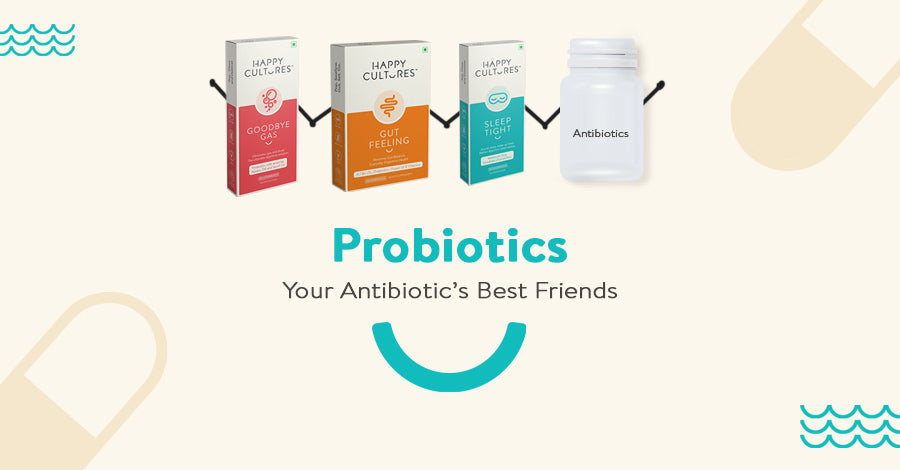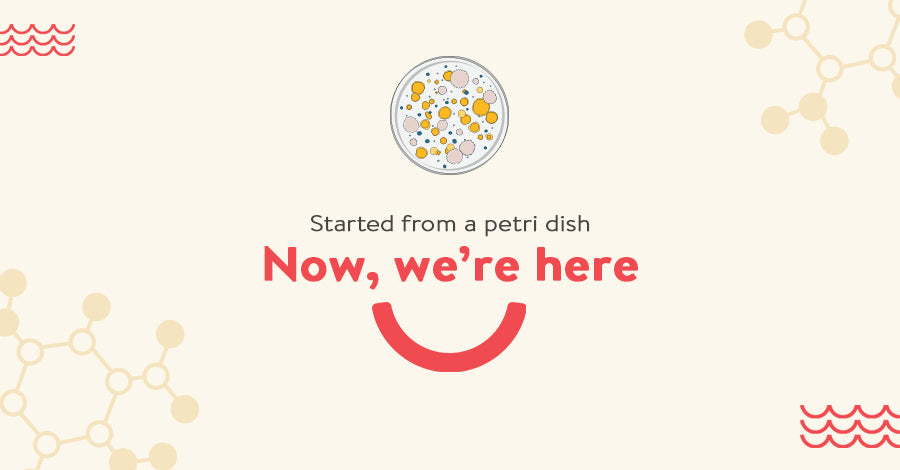Mental Health and Gut Bacteria: How the Gut-Brain Axis Affects Depression and Anxiety
What if your mental health struggles weren’t just “in your head”?
What if your gut bacteria played a major role in how you feel emotionally?
Mounting evidence shows a deep, two-way connection between our brain and digestive system, known as the gut-brain axis. This axis is not just a pathway for digestion, but a vital communication line influencing mental health, mood, and even behaviour.
In this blog, we’ll explore how your gut bacteria microbiome influences depression, anxiety, and emotional well-being, through the lens of the gut-brain axis. We'll also explain how an imbalanced gut (dysbiosis) contributes to mental distress, and what you can do to restore harmony.
Already read our blogs on [What is the Gut Microbiome] and [Signs of Dysbiosis]? This blog builds on those insights without repeating them—so we recommend checking them out for deeper context.
The Gut-Brain Axis: Your Second Brain in Action
The gut-brain axis is the communication network linking your gut microbiome to your brain via:
-
Neurons (especially the vagus nerve, the main highway between gut and brain)
-
Hormones (like cortisol and serotonin)
-
Neurotransmitters (chemical messengers like GABA and dopamine)
-
Immune signals and inflammatory markers
In simple terms, your gut constantly sends messages to your brain and your brain talks back.
This system helps regulate mood, stress responses, cognition, sleep, and even social behaviour. Disruptions in this axis can contribute to mental health issues, including anxiety, depression, mental fatigue, and emotional imbalance.
Your Gut Bacteria Are Mood Modulators
Your gut bacteria microbiome the trillions of bacteria, viruses, and fungi that live in your digestive tract play an active role in your brain chemistry.
Certain bacteria in your gut are capable of:
-
Producing serotonin (over 90% of your body’s serotonin is made in the gut!)
-
Generating GABA (gamma-aminobutyric acid), which calms the nervous system
-
Synthesizing dopamine, linked to motivation and pleasure
-
Regulating inflammatory cytokines that affect mood and cognition
When your gut health is optimal, these processes flow smoothly. But when the balance of good vs. bad bacteria tips, a state called dysbiosis, these systems start to malfunction.
Dysbiosis and Mental Health: The Hidden Connection
Dysbiosis is an imbalance in your gut microbiota, often caused by poor gut health diet (high sugar, low fiber, processed food), chronic stress, lack of prebiotics and fermented foods, overuse of antibiotics or antacids, poor sleep and sedentary lifestyle.
This imbalance leads to reduced microbial diversity, decrease in beneficial species like Bifidobacterium and Lactobacillus, overgrowth of harmful bacteria that produce toxins, leaky gut, which lets toxins enter the bloodstream, elevated inflammation, which affects mood and cognitive function
These factors impair your gut-brain axis, leading to symptoms like anxiety, low mood, brain fog, and poor emotional resilience.
Mental Health Conditions Closely Linked to Gut Health
Let’s break down two of the most common mental health issues where gut health plays a huge role:
1. Depression
-
Studies show people with depression have lower levels of certain gut bacteria like Coprococcus and Dialister.
-
These individuals often have a leaky gut, allowing inflammatory molecules to reach the brain.
-
Depression is associated with gut inflammation, altered neurotransmitter levels, and low diversity of microbes.
-
Low levels of butyrate-producing bacteria (which help fight inflammation) are also common.
A 2019 study published in Nature Microbiology found clear associations between the presence of certain gut microbes and quality of life and depression indicators.
link: Nature. 2019 Feb;566(7742):7. doi: 10.1038/d41586-019-00483-5.
2. Anxiety
-
Anxiety is linked with higher levels of cortisol (the stress hormone), gut inflammation, and reduced GABA production.
-
Individuals often show imbalanced gut microbiota, with harmful strains outnumbering beneficial ones.
-
Lactobacillus rhamnosus, a common probiotic strain, has been shown in animal studies to reduce stress-induced behavior by increasing GABA receptors.
(Source: https://pubmed.ncbi.nlm.nih.gov/21876150/)
Symptoms may include:
-
Persistent worry or nervousness
-
Digestive issues (bloating, gas, IBS-like symptoms)
-
Sleep disturbances
-
Poor concentration
All of these can worsen if gut health remains neglected.
The Natural Way to Support the Gut-Brain Axis
You can improve your gut health naturally by focusing on diet, lifestyle, and targeted supplementation that support a diverse and balanced gut bacteria microbiome. These habits not only strengthen your digestive system but also help regulate mood, improve stress resilience, and enhance overall mental health through the gut-brain axis.
Start by following a gut health diet rich in fiber and plant-based diversity. Foods like lentils, oats, leafy greens, and flaxseeds act as fuel for good bacteria, helping them thrive. Incorporate fermented foods such as yogurt, kefir, kimchi, and sauerkraut, which naturally contain live probiotics to replenish your gut microbiome. Include prebiotic-rich foods like garlic, onions, leeks, bananas, and asparagus, these are non-digestible fibers that beneficial bacteria feed on. Avoid or limit ultra-processed foods, refined sugars, and alcohol, all of which can promote dysbiosis and inflammation.
Beyond food, lifestyle plays a huge role. Sleep is critical for gut repair and hormonal regulation. Aim for 7–9 hours of consistent, high-quality sleep by maintaining a regular sleep-wake cycle and creating a calming nighttime routine. Stress relief is equally important chronic stress directly impacts the gut-brain axis. Practices like mindfulness meditation, deep breathing exercises, journaling, and yoga can significantly reduce stress-related damage to your gut health.
Regular physical activity even something as simple as walking for 30 minutes a day, improves gut microbiome diversity and reduces inflammatory markers associated with depression and anxiety. Choose activities you enjoy to stay consistent, such as dancing, swimming, or hiking outdoors (bonus: sunlight helps regulate circadian rhythms and boosts mood).
You can also support your microbiome with gut health supplements, but they should be used wisely. Probiotics like Bifidobacterium longum and Lactobacillus plantarum are among the most studied strains for reducing anxiety and depressive symptoms by modulating neurotransmitter levels and lowering inflammation. Add prebiotic fibers (like inulin or FOS) to further enhance the growth of beneficial bacteria. Postbiotics, the metabolic byproducts of probiotics, help reinforce gut lining integrity and modulate immune responses, an emerging area in gut-brain research.
Additional strategies include staying hydrated (which supports digestion and gut motility), reducing exposure to environmental toxins (like pesticides and plastics that harm gut flora), and spending time in nature or with pets—both shown to increase microbial diversity. For women, maintaining hormonal balance through gut health is especially important, as estrogen and progesterone levels influence microbial composition and mood regulation.
Finally, remember probiotic effects are strain-specific, and not all supplements are created equal. If you're considering psychobiotics, probiotics specifically targeted to support mental health consult a qualified healthcare practitioner for guidance tailored to your needs.
A Brief Word on Microbiome Testing
While microbiome testing can help identify patterns of dysbiosis, low diversity, or inflammation, we recommend it as a secondary tool especially for those with chronic issues not improving through lifestyle changes.
It’s helpful for people looking to personalize their gut health journey with specific diet and supplements for gut health, but it’s not a mandatory step for everyone.
For a deeper dive, check out our blog: [Do You Need Gut Microbiome Testing?]
Heal the Gut to Heal the Mind
If you're experiencing symptoms like chronic anxiety or low mood, fatigue and mental fog, poor sleep and stress, bloating, indigestion, or irregular bowel movements, it may be time to look below the surface, literally.
A healthy gut-brain axis plays a critical role in maintaining mental health and emotional balance. By taking care of your gut bacteria microbiome, reducing dysbiosis, and adopting a gut health diet, you can begin to support your brain from the inside out.
The mind and gut are not separate; they are deeply connected. Improve gut health, and your brain will thank you.





